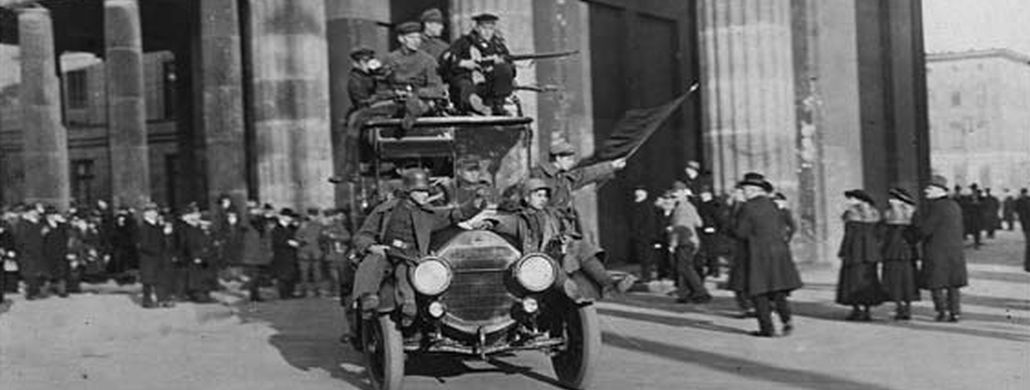
[Germany, 1918/19] The war was lost. Yet, at the end of October 1918, the military commanders ordered, by their own authority, the navy to set sail for a last battle against the British Royal Navy.
The sailors considered it a voyage into their certain death, and refused to follow this order. Revolts broke out in the cities of Kiel and Wilhelmshaven.
“The old and rotten, the monarchy has collapsed. The new may live. Long live the German Republic!”
On November 9, 1918, the revolution reached Berlin. Kaiser Wilhelm II had left the capital days before, he was at the High Command headquarters in Spa, Belgium. Chancellor Max von Baden saw he could not control the situation anymore, and that the Kaiser could no longer be maintained. He urged him to abdicate in favor of a regent, to save at least the monarchy, but Wilhelm could not make up his mind. Finally, Max von Baden acted on his own judgment: without authorization, he declared that Emperor William II had abdicated. Shortly after, he resigned and made Friedrich Ebert of the Majority Social Democrats Chancellor.
Yet, it was too late, and could not calm down the demonstrating crowds. About 2 p.m. that day, the Social Democrat Philipp Scheidemann proclaimed the German Republic from a balcony of the Reichstag. He had no legal authority to do so, but he wanted to be faster than Karl Liebknecht of the Spartacist League who, about the same time, proclaimed the Socialist Republic. On November 10, a Provisional Government was formed, the Council of People’s Deputies (in German: Rat der Volksbeauftragten), with Ebert at the top.
On November 10, Wilhelm II took refuge in the neutral Netherlands.
Since the beginning of November, the revolt spread to other cities and states, in many of which Councils of workers and soldiers were formed, also in Cologne and Bonn. All German ruling princes abdicated. Almost everywhere there was no bloodshed, no assaults, no looting; the councils saw themselves as democratic control bodies in a transitional period and believed that they were acting in the best interest of a new republican government. Still, the political situation was tense.
Lieutenant Max Schmieder
One evening, Kathi and Walter were still driving around distributing food. Due to a flat tire it got so late that they almost ran into the nightly curfew that the Bonn Council of Workers and Soldiers had imposed. Suddenly, they had to stop in front of a road barrier. Immediately several men stepped out of a nearby house, with their tattered clothes and the flat caps pulled in their faces they looked intimidating in the dark. Kathi got out of the car, keeping her chin up, she had not done anything wrong.
But her concern was unnecessary. “Let them drive through, these are the Bergmanns, without them many people around here would have hardly had a warm meal during the war years,” said one of the men. “Bergmann?” a voice called from within the house, and another young man rushed over. “Kathi Bergmann?” Kathi turned to him. “Yes.” “Lieutenant Max Schmieder, at your service! During the war, I often sent my men’s letters to your ‘Stübchen’, and you delivered them to their families. You also collected their gifts for us and sent them to our unit at the front. Now I can thank you in person.”
Lieutenant Schmieder turned out to be a boy whom Kathi knew from childhood. She could not believe it, and neither could he. “Yes, it’s been a long time,” he said, “back then, my whole family had saved up for me to go to high school and later study to become a railway engineer. I lived with my uncle in Cologne.” He pointed to his comrades and went on: “We are now helping the Bonn Council of Workers and Soldiers with all technical work – repairing roads, repairing telephone lines and much more. At the moment we have all our hands full.”
The “unfinished revolution”
“And you’re with the Independent Social Democrats?” Kathi asked. “Yes,” replied Max, “but no, I am not a Bolshevik, I don’t want any Lenin here, for Heaven’s sake no! I want peace, reforms and a government that represents all our people, that’s why I support Haase.”
Kathi also knew Hugo Haase, the chairman of the Independent Social Democrats. Jacob, who had been a pacifist since the bloody war of 1866, had the deepest sympathies for him. Haase, a lawyer, was a kind man who often defended clients against various politically motivated charges for free. Since the end of 1914, opposition in the SPD faction in the Reichstag against further war loans had been growing and eventually, in January 1917, the SPD had broken apart. Those against the war were expelled, among them Hugo Haase, Rosa Luxemburg and Karl Liebknecht. On April 7, the expellees founded the Independent Social Democratic Party of Germany, Haase became chairman.
“I know Ebert has taken on great responsibility,” Max finally said, “may God be with him. Many of the Independents are still hoping for cooperation, even reunification with the SPD, and that’s what most people want – unity among the workers’ parties. But who says that Ebert won’t join forces with the wrong people? Now thousands of our people, voters of the workers’ parties, are out on the road demonstrating in support of the republic, and it seems suspicious to the SPD leaders. They slow it down wherever they can. But the old elites must not be the new ones, and I fear that Ebert relies too much on the Kaiser’s generals and state scoundrels.”
“Now go home,” Max concluded with a crooked smile, “it’s already late, and I do not want anything to happen to you.”

Be the first to comment